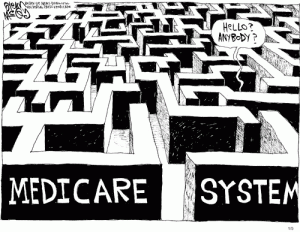Many observers see the likely future of Brookdale as one of dismantling the business into component parts, creating separate businesses that would have greater value than is possible with the integrated whole.
By Jack Cumming
This is the second of two articles reflecting on the Brookdale transition. Zhonghong Zhuoye Group (中弘控股股份有限公司), a Beijing-based conglomerate, has reportedly offered $3 billion for Brookdale. In the first article, “Ruminations on Brookdale’s Lost Opportunities“, we reflected on what may have gone wrong. In this article, we consider potentialities and prospects for the future.
Unlocking Potential
Many observers, including SHF’s Steve Moran in his June 14, 2017, analysis, “What A Brookdale Sale Might Mean“, see the likely future as one of dismantling the business into component parts. The idea is that more focused, separate businesses would have greater value than is possible with the integrated whole. That’s a not uncommon view of how best to unlock hidden value. It’s what motivated Sandell, and it’s what drives the REITs.
Ever since J. P. Morgan reorganized the steel industry in 1901, financial reorganization has been seen as the easy road to corporate wealth. For Brookdale, if it is seen purely as a real estate play, the big question might well be whether senior services is the highest and best use for the real estate. Facilities built for senior housing can readily be repurposed for other uses.
In the larger context, though, if we think beyond the real estate, the opportunity may nevertheless be in bringing change to senior living. That would require thinking far ahead rather than responding to the conventional valuations of today. History shows that the creation of value has not come from the reorganizing of the existing by the likes of J. P. Morgan. It was Henry Ford who unlocked value for the 20th century, and it may be Jack Ma and Jeff Bezos who unlock the value for the 21st. We can learn from these examples in considering the potential for Brookdale, in particular, and for senior living, in general.
In his June 14th article, Steve Moran notes that increasing occupancy at Brookdale could “be like popping something like 50-90 buildings out of the ground and into the marketplace.” That’s an opportunity for new management to improve market penetration; it’s also an opportunity, as Steve notes, to bring a new competitiveness to senior living.
The Disruption Possibility
The alternative to rearranging the pieces, or simply reengineering the status quo, is one of entrepreneurial disruption. As Bezos and Ma have demonstrated over recent years, and as Elon Musk is beginning to illustrate, disrupting established industry practices with a new vision can build far more value than is possible with mere business reorganization. Disruption is market competitiveness taken to a whole new level.
The very nature of entrepreneurship seems inconsistent with the layered hierarchies of large companies, and Zhonghong Zhuoye is very large. It’s unusual for a large enterprise to reinvent an industry and to supersede its own business model, though it’s conceivable. Through many decades, IBM managed to anticipate the next technological revolution – from punch cards to supercomputers – and to stay ahead, but that changed when the company mishandled the personal computer revolution. Ford Motor Company has persistently reinvented itself and today it is a leader in promoting fuel efficient vehicles, though it is being severely challenged by Tesla and Waymo. Both IBM and Ford have been able to act boldly due to founder-family leadership. That’s not present for Brookdale.
Brookdale, with its 1100 communities, has a presence in most areas of the United States. Such ubiquity presents a rare opportunity to extend the corporate vision from the frailty care model of today to a broad community service model for tomorrow. Will it be possible for Brookdale with new ownership to be able to pivot boldly to capture a larger share of the economy? That seems unlikely, though it’s an option.
Putting Consumers First
What has distinguished Amazon and Alibaba from other also-rans is the commitment of the leaders, Jeff Bezos and Jack Ma, to consumer value and their authority to be able to win adherence to that value vision from investors and employees. A similar commitment to consumer fulfillment – beyond the shibboleths of “shareholder value” or, for the tax exempts, “the nonprofit advantage” – could allow disruption of the senior services industry, if not by Brookdale, then by someone. Shareholders are happy with growth. Seniors are not generally tax avoiders.
Here are some of the consumer advantages that are possible.
-
Positive Experience — Marketing care services makes customers feel decrepit. No one wants to move to assisted living, but many people would welcome a social club with services. They’d likely even tolerate the aging people who live there.
-
Convenience — Continuous connectivity makes possible new norms for people of all ages to interact with the central services that a Brookdale location can make available to the larger community.
-
Security — Everyone knows that they should plan ahead, but often the demands of today take precedence over the needs for tomorrow. Financial products linked to Brookdale membership can make securing the future simpler and more accessible for consumers than is today’s model of dark-suited purveyors of retirement, estate, and care plans.
That’s just the surface of the many forms that entrepreneurial disruption of senior services can take (new concepts for employee motivation come quickly to mind). Nevertheless, it’s unlikely that Zhonghong Zhuoye will seize the change opportunity. Large companies tend to be ponderous, laden with layers of decision blockers, and thus slow to respond to changing consumer cultures, market perceptions, and technological potentialities. The giants hew more toward reorganizations (political) and financial manipulations (mergers and acquisitions) than toward fundamental value creation.
Still, if Zhonghong Zhuoye were to disrupt American senior living (with its heavy restraining presence of reactive regulation), then the lessons learned might be deployed to China, where it could provide a happier retirement for the elder generation while freeing the rising generation of young, affluent children from the burdens of tradition. Now that would be a value opportunity without precedent.








